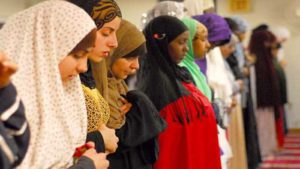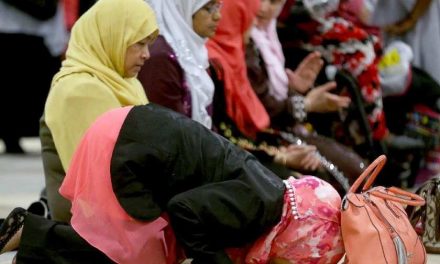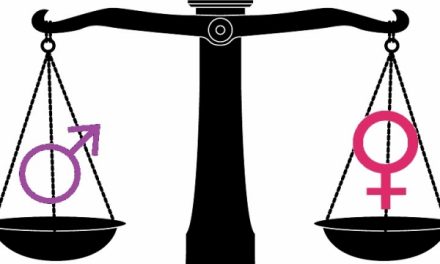Did the Prophet say that a woman’s prayer at home is better than at the mosque?
The answer is: No, not for all women, nor in all times. The hadith quoted in the previous chapter, which was narrated by Ibn Hibban and Ahmad about Um Humaid (“your prayer at home is better than your prayer in congregation”) is authentic, but incomplete! The context or the full story of the hadith was not explained in the famous narrations.
However, the other narrators of the same story, namely, Al-Tabarani, Al-Baihaqi, Ibn Abu Shaibah, and Ibn Abu Aasim, gave more detail. Their (authentic) additions explained that the context of the hadith was an argument between Um Humaid and Abu Humaid Al-Saedi, her husband. The argument was due to Um Humaid’s regular attendance of congregational prayer in the Prophet’s, peace be upon him, mosque. In these narrations, Um Humaid visited the Prophet with a group of women and said, “O Messenger of Allah, we like to pray with you but our husbands prevent us from coming to the mosque.”[1]
Abu Humaid Al-Saedi was from the family of Bani Saedah, a branch of Al-Khazraj Tribe in Medina. They used to live far from the Prophet’s mosque, beyond the borders of Medina at the time, and they had their own farms, their own Bani Saedah Council (saqeefat bani saedah) and their own mosque, which the Prophet, peace be upon him, visited once and prayed in (Ibn Majah No. 1217).
Therefore, the Messenger of Allah, peace be upon him, only intended to resolve a marital disagreement between Um Humaid and Abu Humaid, over the long distance she had to walk 5 times a day to pray behind him in his mosque. The Prophet basically advised Um Humaid to accommodate her husband’s request, for the sake of her children and family, and pray in the tribe’s mosque or at home.
There is no evidence that the Prophet, peace be upon him, meant to change the default rule for women to visit the Houses of Allah, or even the special reward for praying in his mosque, peace be upon him, which he mentioned in several other narrations, for visitors to his mosque, men and women. This is the only possible interpretation that resolves the conflict between the different hadiths. The basic juridical rule states that the application of all scripts is better than neglecting any of them.
I do have an issue, however, with the narrations stating that Um Humaid chose the “darkest” and “furthest” spot in her house to pray in! I believe that, if these narrations were true, it was Um Humaid’s preference to choose that spot rather than the Prophet’s instruction, peace be upon him. There are hundreds of other narrations that include women praying in congregation, and none of them included a recommendation to choose a “dark” or a “far” spot.
Other than the hadith of Um Humaid discussed above, there is no other authentic narration that could have implied discouraging or preventing women from visiting the mosque, or a general rule that their praying at home is better than praying in the Prophet’s Mosque itself. In fact, the Prophet, peace be upon him, famously said: “One prayer in this mosque of mine is better than one thousand prayers elsewhere, except for the Sacred Mosque in Mecca.”[2] The Prophet, peace be upon him, in this recommendation made no differentiation between men and women.
However, some scholars, advocating the prevention of women from frequenting the mosque, have relied on a number of non-authentic narrations as supporting evidence! Yet, such weak narrations do not constitute a solid proof or countermand the numerous authentic hadiths supporting the contrary opinion.
Let us discuss one example of these non-authentic narrations, which unfortunately appear in numerous contemporary fatwa related to women and visiting the mosque.[3] It is the narration that claims that the Prophet, peace be upon him, asked his daughter Fatimah about what is best for a woman. The narration claims that Fatimah answered, “that she should see no man and that no man should see her.” The Prophet, according to the narration, then hugged her and said, “good offspring descending from one another.”[4] In addition to its weak chain of narration (isnad), the meaning of this hadith contradicts with many explicit statements of the Quran about women’s interaction with men in various circumstances and events, including the verse in which Allah included the Children of the Prophet, including Fatimah, in one of those events,
{Then whoever argues with you Muhammad about it after this knowledge has come to you – say, ‘Come, let us call our children and your children, our wives and your wives, ourselves and yourselves, then supplicate earnestly together and invoke the curse of Allah upon the liars among us.’} (3:61)
This verse explicitly mentions the children of the Prophet, peace be upon him. Ibn Kathir commented on the verse, and mentioned the story of the Najran’s delegation, stating:
They refused to acknowledge the truth. Then, when dawn broke, the Prophet, peace be upon him, after informing them of the newly revealed verses, came out with Al-Hassan and Al-Hussayn wrapped in a velvet cloth of his, and Fatimah came out walking behind him.[5]
There are also numerous other Hadiths that involve Fatimah, may Allah be pleased with her, “seen” in public in various contexts and dealing with men in a normal way.
Finally, it is to be noted that a woman’s visit to the mosque, and a man’s visit as well, is not supposed to compromise other duties that are of higher priority. This consideration is relative, of course, subject to individuals and families and their specific circumstances. That is why the Prophet, as discussed earlier, recommended that Um Humaid stays closer to her family, and as discussed later, he did not require from women to pray the Friday Prayers in the mosque as he required from men. There is a special consideration given to women, given their various family and care-giving circumstances, especially mothers with small children. The general rule, however, is that it is impermissible to prevent women from going out to the mosque, if they wish to, and that her performing of a regular prayer in the mosque is better and more rewarding than her praying at home or anywhere else.
[1] Al-Baihaqi, 190/3; At-Tabarani in Al-Mu`jam Al-Kabir, 148/25 and Al-Ahad wal-Mathani, 150/6.
[2] Bukhari 1190, Muslim 1394, and multiple other narrations in Bukhari, Muslim and other collections.
[3] For example, www.almunajjid.com/6433
[4] Its chain of narration is weak, so reported Al-Albani in AlSilsilah Al-Daeefah 5743, Abu Nuaim in Al-Hilya 2/40, and others.
[5] Ibn Kathir, Tafsir 54/2.






